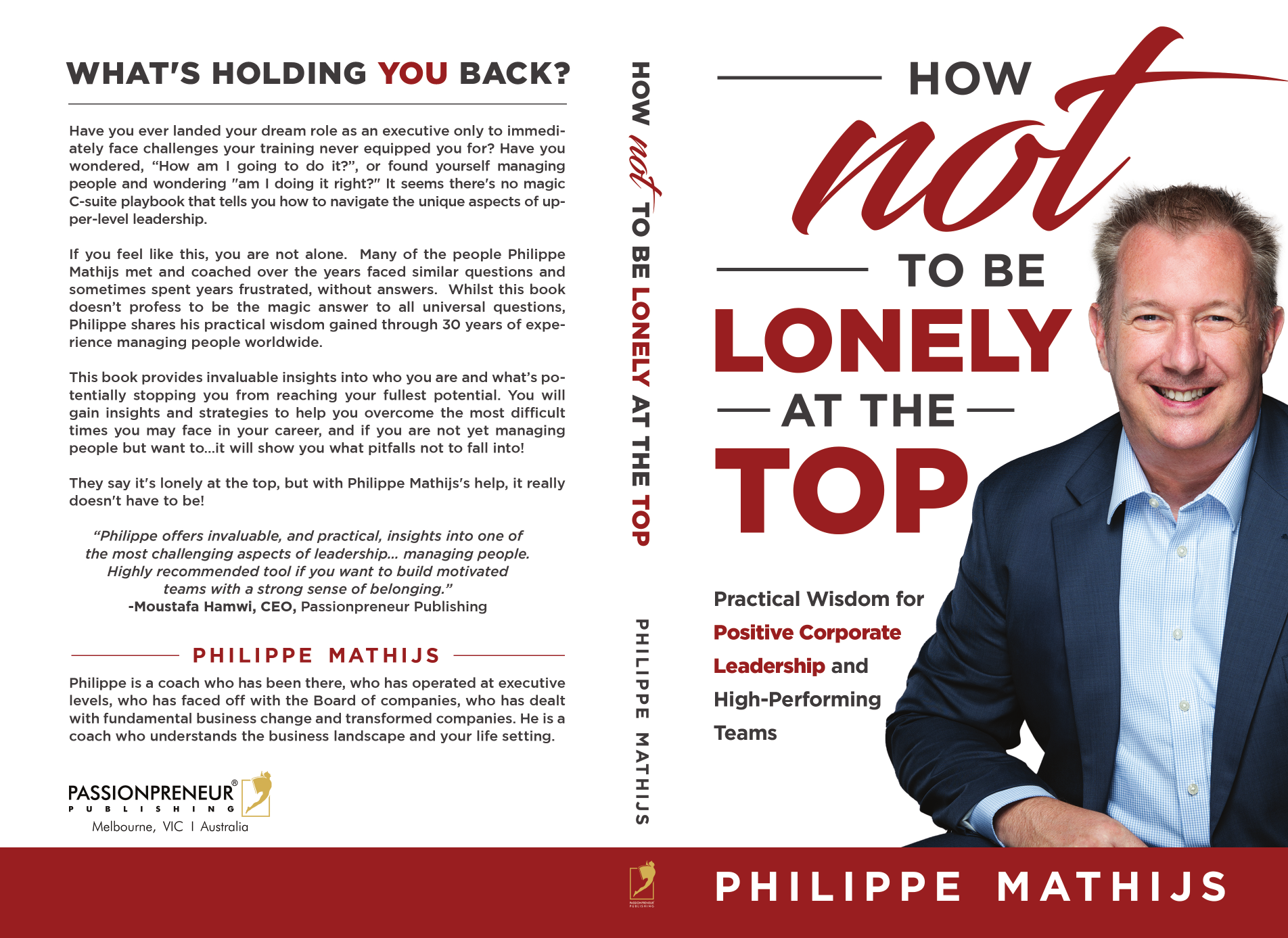#INTERVIEW with Philippe Mathijs, Author of "How Not To Be Lonely at the Top"

With almost 30 years experience as a distinguished executive coach and leadership consultant, Philippe Mathijs is best known for his transformative approach to developing effective leaders and empowering organisations. His expertise, spanning Business, Risk, and IT disciplines, offers a unique perspective on the challenges leaders face today.
LOA: In your book, "How Not to Be Lonely at the Top, you emphasise the importance of leaders prioritising well-being; can you tell us how this message extends to those outside of leadership roles?
PM: Well-being is a fundamental aspect of human life, and its importance transcends professional hierarchies. For individuals outside of leadership roles, the message is clear: taking care of oneself is a prerequisite for leading a fulfilling life. This includes maintaining a balanced lifestyle, engaging in physical activities, nurturing mental health, and fostering supportive relationships.
Well-being is not a luxury but a necessity, and the practices I advocate can be integrated into daily routines regardless of one's position. This includes setting boundaries to avoid burnout, engaging in activities that bring joy and relaxation, and seeking help when needed. By adopting these practices, you can enhance your overall quality of life, leading to improved productivity, better relationships, and a more profound sense of purpose. The strategies I offer are designed to be flexible and adaptable, ensuring that everyone can benefit from them, regardless of their career stage or life situation.
LOA: Can you elaborate on some of the strategies you offer for cultivating meaningful connections in today's seemingly isolated corporate environment?
PM: In today's increasingly isolated environment, cultivating meaningful connections requires deliberate effort and thoughtful strategies. One of the primary strategies I recommend is leveraging digital tools to stay connected. Regular video calls, virtual meet-ups, and online communities can help bridge the gap created by physical distance. It's essential to schedule these interactions consistently to maintain a sense of continuity and connection.
Another strategy is to engage in community activities, whether they are virtual or in-person where possible. Joining groups that align with your interests or volunteering for causes you care about can provide a sense of belonging and purpose. These activities offer opportunities to meet like-minded individuals and build new relationships.
Practicing active listening is crucial in deepening existing connections. This means being fully present in conversations, showing empathy, and responding thoughtfully. Demonstrating genuine interest in others' lives and experiences can strengthen bonds and create a supportive network.
Additionally, I advocate for creating rituals or traditions with friends and family, such as weekly dinners, book clubs, or movie nights, even if they are conducted virtually. These regular interactions can provide structure and a sense of normalcy, which are vital in maintaining meaningful connections in an isolated environment.
LOA: How does your approach to loneliness intersect with broader societal conversations around mental health and social connection?
PM: My approach to addressing loneliness is deeply intertwined with broader societal conversations around mental health and social connection. Loneliness is not just an emotional experience; it has significant implications for mental health, often leading to conditions like depression, anxiety, and even physical health issues. By addressing loneliness, we are simultaneously promoting mental wellness.
In the book, I emphasise the importance of recognising loneliness as a common human experience rather than a personal failing. This perspective aligns with contemporary mental health dialogues that advocate for de-stigmatising mental health issues and promoting open discussions. By fostering environments where individuals feel safe to express their feelings and seek support, we contribute to a culture of understanding and empathy.
Moreover, my approach includes practical strategies for building social connections and enhancing one's social network, which are crucial elements in the broader context of mental health. Initiatives such as community-building activities, support groups, and mental health awareness programs are integral to my methodology. These efforts not only help individuals combat loneliness but also foster a sense of community and belonging, which are essential for overall mental well-being.

LOA: In what ways can the insights from "How Not To Be Lonely At The Top" be applied to personal relationships and social circles?
PM: The insights I write about are highly applicable to personal relationships and social circles. The principles of active listening, empathy, and consistent communication are universal and can significantly enhance personal interactions. For example, in personal relationships, practicing active listening means being fully present during conversations, acknowledging your partner's feelings, and responding with empathy. This can strengthen the emotional connection and trust between individuals.
Empathy, another key principle, involves understanding and sharing the feelings of others. In personal relationships, demonstrating empathy can help in resolving conflicts, building deeper connections, and fostering a supportive environment. It encourages openness and vulnerability, which are essential for meaningful relationships.
Consistent communication is vital in maintaining and nurturing personal relationships. This means regularly checking in with friends and family, sharing experiences, and expressing appreciation. Simple gestures like sending thoughtful messages, making time for regular catch-ups, and celebrating important milestones can go a long way in sustaining relationships.
Additionally, the book's insights on self-care and personal growth can be applied to personal relationships by encouraging individuals to be the best version of themselves. By prioritising self-awareness and personal development, individuals can bring more authenticity and positivity into their relationships, creating a more fulfilling and supportive social network.
LOA: Loneliness is often stigmatised. How do you seek to de-stigmatise this issue and encourage open dialogue?
PM: To de-stigmatise loneliness and encourage open dialogue, I advocate for several key approaches. First and foremost, it is essential to create safe spaces where individuals feel
comfortable sharing their experiences without fear of judgment. This can be achieved through support groups, workshops, and community discussions focused on the topic of loneliness.
By sharing personal stories and experiences, we can help normalise the conversation around loneliness. When people see that they are not alone in their feelings, it reduces the stigma and encourages others to open up. In my workshops and talks, I emphasise that loneliness is a common human experience, not a sign of weakness or failure.
Education is another powerful tool in de-stigmatising loneliness. Providing information about the causes and effects of loneliness, as well as practical strategies for overcoming it, can help individuals understand that it is a manageable issue. Awareness campaigns, articles, and books on the topic can also play a significant role in changing societal perceptions.
Furthermore, I promote the idea that seeking help is a sign of strength, not weakness. Encouraging individuals to reach out for support from friends, family, or professionals can help them feel empowered to take control of their situation. By fostering a culture of empathy and support, we can create an environment where discussing loneliness is not only accepted but encouraged.
LOA: What role does self-awareness play in your approach to addressing loneliness and fostering authentic connections?
PM: Self-awareness is a cornerstone of my approach to addressing loneliness and fostering authentic connections. It involves understanding one's own emotions, behaviours, and social needs. By being self-aware, individuals can identify the patterns and triggers that contribute to their feelings of loneliness.
Self-awareness allows individuals to recognise when they are feeling lonely and understand the underlying reasons for those feelings. This understanding is the first step in addressing loneliness effectively. It enables individuals to take proactive steps to change their situation, such as reaching out to others, engaging in activities that bring joy, or seeking professional help if needed.
Moreover, self-awareness helps individuals understand their social needs and preferences. Some people may thrive in large social gatherings, while others may prefer smaller, more intimate interactions. By knowing what works best for them, individuals can seek out and cultivate relationships that are fulfilling and authentic.
In fostering authentic connections, self-awareness plays a crucial role in how individuals present themselves in social interactions. Being true to oneself and expressing genuine thoughts and feelings can attract like-minded individuals and create deeper, more meaningful relationships. Authenticity fosters trust and openness, which are essential components of strong social connections.
Overall, self-awareness empowers individuals to take control of their social lives, make informed decisions about their relationships, and create a supportive and fulfilling social network. At the end of the day, loneliness is a choice. By applying the practical wisdom discussed in the book, anyone can build enduring relationships. foster trust and create a supportive community that ensures your leadership journey remains fulfilling and far from solitary. The summit is yours to conquer, and with the lessons you learn along the way (and the lessons in the book), you can thrive at the top, embracing the camaraderie and companionship that comes with effective leadership. Always remember that you're great, and that within each of us, we have the ability to be outstanding.



.jpg)






